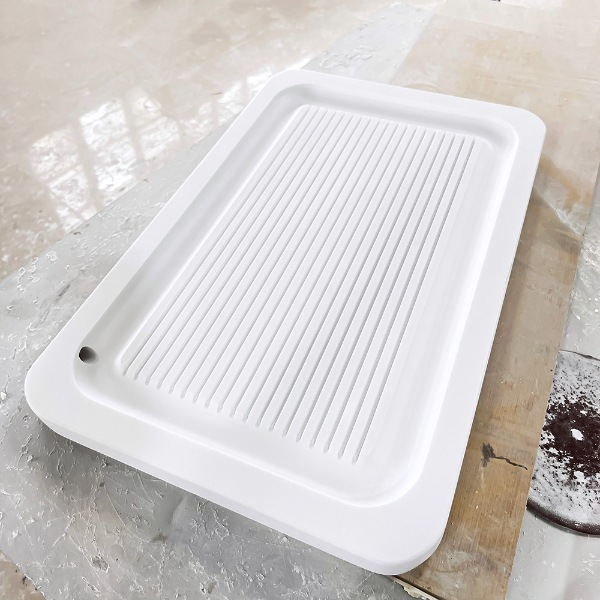
Artificial Stone Slab is an engineered material that combines the advantages of modern manufacturing technology and materials science by simulating the look and texture of natural stone. This material is widely used in a variety of architectural and decorative projects, and has won the market's favor with its unique aesthetic effect and excellent performance.

What is Artificial Stone slab?
Artificial Stone Slabs are a composite material made from a mixture of natural ores, resins, pigments and other materials. They mimic the appearance of natural stone through a sophisticated manufacturing process, but offer increased durability and flexibility. The manufacturing process of Artificial Stone Slabs allows for a wide range of colors and textures to be created, allowing for greater freedom in design.
The main types of engineered stone slabs
1.Engineered Quartz: Made from a mixture of crushed quartz crystals, resins and pigments, it offers high abrasion resistance and a wide range of color options. It has a uniform, seamless surface and is suitable for kitchen countertops and bathroom décor.
2.Solid Surface: Made from a mixture of acrylic resin and natural minerals, it can mimic the appearance of various types of stone and can be seamlessly spliced together, making it suitable for countertops, sinks and wall decorations.
3.Cultured Marble: made from marble powder mixed with resin, similar in appearance to natural marble, but with higher durability and lower maintenance requirements.
Advantages of Artificial Stone Slabs
1.High durability: Artificial stone slabs are highly resistant to scratches, dirt and impact. They have a smooth and sturdy surface that can withstand the wear and tear and impacts of everyday use.
2.Non-porous: The non-porous surface of artificial stone slabs prevents the growth of moisture, dirt and bacteria, making them more hygienic and easy to clean.
3.Easy Maintenance: Compared to natural stone, artificial stone slabs require less maintenance. Most stains and scratches can be easily removed by simply cleaning with mild soap and water.
4.Wide range of customization options: Artificial stone slabs can be customized with colors, textures and shapes to meet a variety of design styles and functional requirements.
5.Environmentally friendly: Many artificial stone slabs are made from recycled materials, which meets environmental requirements and has a relatively low impact on the environment during the production process.
Application Areas
1.Kitchen countertops: Due to its wear-resistant, stain-resistant and easy-to-clean characteristics, artificial stone slabs are widely used in kitchen countertops, providing both aesthetic and practical solutions.
2.Bathroom Decoration: The non-porous nature of Artificial stone slabs makes them ideal for bathroom walls, basins and showers, easy to maintain and highly resistant to water.
3.Flooring and walling: The diverse designs and color options of artificial stone slabs make them suitable for flooring and wall decorations, which can add unique styles to interior spaces.
4.Furniture and other customized designs: Artificial stone slabs can also be used to make customized furniture and decorative pieces, such as table tops, wall panels and decorative strips.
Maintenance and Care
1.Daily Cleaning: Use mild soap and water for daily cleaning, avoid using strong acid, alkali or abrasive cleaners to prevent damage to the surface.
2.Stain removal: For stubborn stains, use a non-abrasive cleaner and a soft cloth. Serious stains or scratches may require professional restoration services.
3.Prevent heat damage: Although artificial stone slabs are heat resistant, insulating pads should still be used to avoid direct contact with hot items to protect the integrity of the countertop.
4.Avoid scratches: Use cutting boards and other protective measures to avoid scratching the surface.
Future Trends
As technology advances, the production process for artificial stone slabs continues to improve. In the future, artificial stone slabs may evolve in the following areas:
1.Application of environmentally friendly materials: more use of recyclable and environmentally friendly materials to reduce the impact on the environment.
2.Higher durability: Improve the abrasion resistance, scratch resistance and high temperature resistance of the material.
3.More design options: offering a greater variety of colors, textures and effects to meet a wider range of design needs.
Artificial stone slabs occupy an important place in modern architecture and interior design due to their superior durability, aesthetics and ease of maintenance. Their diverse applications and evolving technology have made them a favorite choice for designers and consumers alike. Whether it's for kitchen countertops, bathroom décor or floor wall coverings, artificial stone slabs offer a solution that is both aesthetically pleasing and practical.